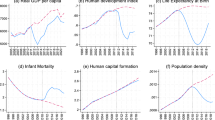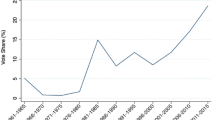Abstract
A large body of literature stresses the benefits of regime stability for economic growth in poor countries. This view, however, discounts the gains from threats to regime security when populations living under dictatorial regimes cannot benefit from the disciplining of political competition available to voters in democracies. This paper applies a model of economic growth to study the sources of the differences in economic performance and repression policy among dictatorships as well as the parallel in dictatorial regimes of the benefits achieved through political competition in democracies. Threats to the security of dictatorial regimes are shown to be a means of benefiting the population through the responses of the regime.
Similar content being viewed by others
References
Abed, G. T., & Gupta, S. (Eds.) (2002). Governance, corruption and economic performance. Washington: International Monetary Fund.
Barro, R. (1996). Getting it right. Cambridge: MIT Press.
Bourguignon, F., & Verdier, T. (2000). Oligarchy, democracy, inequality and growth. Journal of Development Economics, 62, 285–313.
Campos, N. F., & Nugent, J. B. (2002). Who is afraid of political instability? Journal of Development Economics, 67, 157–172.
Campos, N. F., & Nugent, J. B. (2003). Aggregate investment and political instability: An econometric investigation. Economica, 70, 533–549.
Campos, J., & Root, H. (1996). The key to the Asian miracle. Washington: Brookings.
Charap, H., & Harms, C. (1999). Institutionalized corruption and the kleptocratic state. IMF working paper 99/91, International Monetary Fund, Washington, DC.
Easterly, W. (2001). The elusive quest for growth: economists’ adventures and misadventures in the tropics. Cambridge: MIT Press.
Easterly, W., & Levine, R. (1997). Africa’s growth tragedy: policies and ethnic divisions. Quarterly Journal of Economics, 112, 1203–1250.
Engineer, M., & Usher, D. (1987). The distribution of income in a despotic society. Public Choice, 54, 261–276.
Goldhagen, J. D. (1996). Hitler’s willing executioner: Ordinary Germans and the holocaust. New York: Knopf.
Grossman, H. I. (1991). A general equilibrium model of insurrection. American Economic Review, 81, 912–921.
Grossman, H. I., & Noh, S. J. (1990). A theory of kleptocracy with probabilistic survival and reputation. Economics and Politics, 2, 157–171.
Grossman, H. I., & Noh, S. J. (1994). Proprietary public finance and economic welfare. Journal of Public Economics, 53, 187–204.
Hall, R. E., & Jones, C. I. (1999). Why do some countries produce so much output per worker than others? Quarterly Journal of Economics, 114, 83–116.
Hillman, A. L. (2004). Nietzschean development failures. Public Choice, 119, 263–280.
Hirshleifer, J. (1991). The paradox of power. Economics and Politics, 3, 177–200.
Hume, D. (1870). Essays, literary, moral, and political. London: Ward Lock.
Islam, M. N., & Winer, S. L. (2004). Tinpots, totalitarians (and democrats): An empirical investigation of the effects of economic growth on civil liberties and political rights. Public Choice, 118, 289–323.
Londregan, J., & Poole, K. (1991). Poverty, the coup trap, and the seizure of executive power. World Politics, 42, 151–183.
Mueller, D. C. (2003). Public choice III. Cambridge: Cambridge University Press.
Murdoch, J., & Sandler, T. (2002). Economic growth, civil wars and spatial spillovers. Journal of Conflict Resolution, 46, 91–110.
North, D. C., & Thomas, R. P. (1973). The rise of the western world. Cambridge: Cambridge University Press.
O’Kane, R. (1984). A probabilistic approach to the causes of coups d’etat. British Journal of Political Science, 11, 287–308.
Overland, J., Simons, K.L. & Spagat, M. (2005). Political instability and growth in dictatorships. Public Choice, 125, 445–470.
Rodrik, D. (1999). Where did all the growth go? External shocks, social conflict, and growth collapses. Journal of Economic Growth, 4, 385–412.
Roemer, J. E. (1985). Rationalizing revolutionary ideology. Econometrica, 53, 85–108.
Rowley, C. (2000). Political culture and economic performance in sub-Saharan Africa. European Journal of Political Economy, 16, 133–158.
Sah, R. (1991). Fallibility in human organization and political systems. Journal of Economic Perspectives, 5, 67–88.
Sanhueza, R. (1999). The hazard rate of political regimes. Public Choice, 98, 337–367.
Sargent, T. J., & Velde, F. R. (1995). Macroeconomic features of the French revolution. Journal of Political Economy, 103, 474–518.
Tse-tung, M., & Griffith, B. S. (2005). On guerrilla warfare. Chapmaign: University of Illinois Press.
Tullock, G. (1980). Efficient rent seeking. In J. M. Buchanan, R. D. Tollison, & G. Tullock (Eds.), Towards a theory of the rent-seeking society (pp. 97–112). College Station: Texas A&M University Press.
Tullock, G. (2005). The social dilemma: of autocracy, revolution, coup d’état, and war. Indianapolis: Liberty Fund.
Usher, D. (1989). The dynastic cycle and the stationary state. American Economic Review, 79, 1031–1044.
Verwimp, P. (2003). The political economy of coffee, dictatorship, and genocide. European Journal of Political Economy, 19, 161–181.
Wintrobe, R. (1990). The tinpot and the totalitarian: An economic theory of dictatorship. American Political Science Review, 84, 849–872.
Wintrobe, R. (1998). The political economy of dictatorship. New York: Cambridge University Press.
Wintrobe, R. (2004). Dictatorship. In C. K. Rowley & F. Schneider (Eds.), The encyclopedia of public choice (Vol. 1, pp. 77–90). Dordrecht: Kluwer Academic.
Author information
Authors and Affiliations
Corresponding author
Rights and permissions
About this article
Cite this article
Bar-El, R. Dictators, development, and the virtue of political instability. Public Choice 138, 29–44 (2009). https://doi.org/10.1007/s11127-008-9337-3
Received:
Accepted:
Published:
Issue Date:
DOI: https://doi.org/10.1007/s11127-008-9337-3




